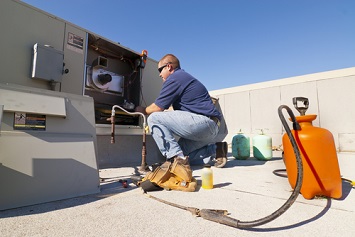Wasted energy literally means money out the door of your business—and ultimately lower profitability. In addition, there is a strong correlation between the comfort of your space and an efficient HVAC system, which is another reason to focus on this often-overlooked topic.
Here are seven ways to tell if your business’s HVAC system is wasting energy.
1. You Don’t Know the Age of Your HVAC Equipment
One of the first questions I ask at a business is “what is the age of the HVAC equipment?” Knowing the exact age of the equipment is incredibly important, as it will tell you when to start thinking about a replacement schedule. Replacing an HVAC unit on a hot or cold day is incredibly stressful on a business, and it can lead to lost revenue. Knowing the age of the unit gives you the power to make a decision on when and how it gets replaced instead of having to react to a unit that breaks.
Finding the age is fairly easy—just ask your technician to take a picture of the model and serial number of the unit (or hop on the roof yourself and take a photo of it). The age is often decoded in the serial number, usually as the third and fourth number. For example, 381429xxx would have been manufactured in 2014. Each brand has its own way of telling the age and where the unit was made, so you can easily Google this information.
2. Proactive Replacement Schedule
You will be in a reactive position when your HVAC system breaks if you don’t have a rough plan for when to replace it. Our rule of thumb is that modern commercial HVAC units will work well for 10 years, will likely survive 12–14 years, and will be on borrowed time after that.
While this decision is slightly different depending on whether you own or lease the building, you still need proper cooling and heating HVAC equipment for your business. Make a plan, and budget for it based on your comfort level—typically somewhere between years 10 and 14.
High-efficiency HVAC equipment takes longer to manufacture and is not sitting in local distribution warehouses. For that reason, you can’t replace a 14-year-old HVAC unit that breaks down in the summer in a rush situation. In that scenario, you’d have to get the standard efficiency unit that will cost more to operate over the long run. In addition, utility incentives can often cut deep into the costs of replacement units, so you might actually be paying more for a less efficient unit because of the rush.
We advise our commercial customers to get a quote on a CEE Tier 2 high-efficiency replacement HVAC unit for any unit that is 12 years or older each year. You don’t need to make the replacement, but you’ll have all the information to decide and make a budget.
3. Pressure Issues
If there is resistance when you open or close the door to your shop, it means the pressure is imbalanced, indicating that something is pulling more air out of your building than is entering or vice versa. In a restaurant, this is often caused by cooking exhaust fans pulling out more air than is being replaced.
When air is imbalanced, it means that cold or hot air is being wasted somewhere, which creates drafts in your business. Drafts make for uncomfortable clients or staff, which can have greater costs to your business than the energy being wasted.
Air can be balanced from a professional service company that can adjust the equipment to get the proper balance.
4. High Humidity
Humidity is a tough one to detect, but modern smart thermostats will often give you this reading. You can also buy small meters to give you this information if it’s not on your existing thermostat. Too much humidity in the summer likely means something is not cooling your air properly or that your economizer is not working correctly. Dehumidifiers can help, but modern HVAC equipment should be able to balance your humidity in most situations.
Finding the cause of humidity is important, as it could lead to mold or mildew and your system may have to over-cool to reach a normal comfort level.
5. You Don’t Have a Smart Thermostat
If you are heating your business the same at night as during the day in winter, you are wasting energy. I have argued this point with many in the industry, but there is so much data that this is less opinion than fact. Equipment that starts and stops runs less efficiently than equipment that runs continuously.
The same concept applies to air conditioning but can be more significant. If your business closes at 5 p.m. but it is hot until 10 p.m., a significant amount of cooling needs to be done for an empty space. In addition, the business will cool off overnight naturally as the air temperature drops—and the temperature drop is even greater in cities with an urban heat island.
6. Your Staff Can Change the Temperature
While you want everyone to be comfortable in your business, changing the thermostat should not be a democratic experience. If your manager raises the thermostat every time a customer complains, it can cost the business a significant amount of money in wasted energy. Temperature should be thoughtful and intentional and ensure people are as comfortable as can be minimally provided.
In addition, allowing your staff to fight over the temperature can lead to ping pong swings, which is not good for anyone.
7. Lack of Routine Maintenance
HVAC equipment needs TLC, just like a car needs oil changes and routine maintenance.
The parts of the equipment that should be checked first are the air filters, which should be changed frequently. If they are not changed, they can lead to decreased air flow and wasted energy.
Other small adjustments to fan belts and economizers can dramatically impact the energy efficiency of an HVAC unit. An economizer brings in outside air when it is cooler outside and the thermostat calls for air conditioning, which happens a lot in restaurants because of the kitchen heat. Improperly working economizers waste energy and put unnecessary miles on the compressor, which can shorten the life of the HVAC system.
 Jamie Johnson founded Verde Energy Efficiency Experts in 2010 with the mission to find and implement energy efficiency savings for customers in unexpected places within their business. Verde continues to grow its diverse offerings to businesses in order to provide solutions to lower operating costs and improve their triple bottom line. Jamie Johnson founded Verde Energy Efficiency Experts in 2010 with the mission to find and implement energy efficiency savings for customers in unexpected places within their business. Verde continues to grow its diverse offerings to businesses in order to provide solutions to lower operating costs and improve their triple bottom line. |

